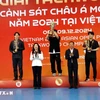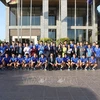Leaving the bustling street life of Hanoi ’s old quarter behind, you will enter a quiet world of books and magazines, all second-hand, lying in piles, in house No.5 on Bat Dan street.
The owner of the house is Phan Trac Canh, who has been famed as the “King of second-hand books”, boasting a book collection that probably weights up to 10 tones.
“I think each book has its own soul. If you and it are fated, it will find a way to come to you,” Canh said, recalling his nearly 30-year journey to satisfy his hobby.
Here in his house, books are not put on shelves. They are placed on stairways, floors, tables, cupboards, or on any place that is empty.
The owner doesn’t seem to care about organising the books--just about how to spot and get the book he or his visitor wants to read.
Canh said he began to collect second-hand books in 1983 after retiring from his job at the Literary Faculty of the University of Hanoi , now the University of Social Sciences and Humanities.
The very first books to appear in Canh’s collection were literary works of writers from the group called Tu Luc Van Doan as he had a great love for these masterpieces.
To expand his treasure trove, Canh sought precious books from the people who collected scraps of all kinds, including old newspapers and books. Sometimes, he has travelled to other localities, such as Nam Dinh, Ha Dong and Bac Ninh, to buy valuable second-hand books.
At the beginning, Canh’s book collection had just several hundred titles. Now, the collection is estimated to weigh as much as 10 tonnes, including many precious publications as “Han Van Tan Giao Toan Thu” published in 1928, and the French-language “Souvernirs de Hue” published in 1867.
Canh also owns up to 300 books on Hanoi , and many others featuring Vietnam ’s 54 ethnic groups, the life and culture of traditional villages in Vietnam , and the Hoa ethnic people in Vietnam .
Besides books, the Hanoian has collected newspapers, with some marking important milestones in the development history of the Vietnamese press, such as the Gia Dinh newspaper – the first Vietnamese-language newspaper in Vietnam , the Nam Viet and Phu Nu Tan Van newspapers, and the entire set of the “Vien Dong Bac Co” printed in French in 1901.
Characterised as a library, Canh’s “second-hand book house” has drawn a large number of bookworms to visit and discuss the books they loved, including prominent figures in the arts such as Phan Huy Le, Ha Van Tan and Phan Ngoc.
Canh said he has also welcomed even professors and scholars from Russia , France and Japan who come to seek materials and documents for their studies on Vietnam .
Now at the age of 80, Canh said he is looking for someone who can take care of the tens of thousands of books in his collection so he can retire.
Books can make you rich, and Canh has helped many people get richer and richer with his collection./.
The owner of the house is Phan Trac Canh, who has been famed as the “King of second-hand books”, boasting a book collection that probably weights up to 10 tones.
“I think each book has its own soul. If you and it are fated, it will find a way to come to you,” Canh said, recalling his nearly 30-year journey to satisfy his hobby.
Here in his house, books are not put on shelves. They are placed on stairways, floors, tables, cupboards, or on any place that is empty.
The owner doesn’t seem to care about organising the books--just about how to spot and get the book he or his visitor wants to read.
Canh said he began to collect second-hand books in 1983 after retiring from his job at the Literary Faculty of the University of Hanoi , now the University of Social Sciences and Humanities.
The very first books to appear in Canh’s collection were literary works of writers from the group called Tu Luc Van Doan as he had a great love for these masterpieces.
To expand his treasure trove, Canh sought precious books from the people who collected scraps of all kinds, including old newspapers and books. Sometimes, he has travelled to other localities, such as Nam Dinh, Ha Dong and Bac Ninh, to buy valuable second-hand books.
At the beginning, Canh’s book collection had just several hundred titles. Now, the collection is estimated to weigh as much as 10 tonnes, including many precious publications as “Han Van Tan Giao Toan Thu” published in 1928, and the French-language “Souvernirs de Hue” published in 1867.
Canh also owns up to 300 books on Hanoi , and many others featuring Vietnam ’s 54 ethnic groups, the life and culture of traditional villages in Vietnam , and the Hoa ethnic people in Vietnam .
Besides books, the Hanoian has collected newspapers, with some marking important milestones in the development history of the Vietnamese press, such as the Gia Dinh newspaper – the first Vietnamese-language newspaper in Vietnam , the Nam Viet and Phu Nu Tan Van newspapers, and the entire set of the “Vien Dong Bac Co” printed in French in 1901.
Characterised as a library, Canh’s “second-hand book house” has drawn a large number of bookworms to visit and discuss the books they loved, including prominent figures in the arts such as Phan Huy Le, Ha Van Tan and Phan Ngoc.
Canh said he has also welcomed even professors and scholars from Russia , France and Japan who come to seek materials and documents for their studies on Vietnam .
Now at the age of 80, Canh said he is looking for someone who can take care of the tens of thousands of books in his collection so he can retire.
Books can make you rich, and Canh has helped many people get richer and richer with his collection./.



















